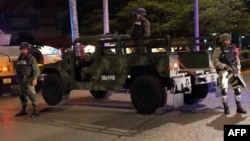Authorities in the resort city of Cancun found two dismembered bodies stuffed in suitcases Friday and one suspected gunman was killed in a gunbattle on a downtown boulevard, just days ahead of a regional gathering that is to include top Latin American diplomats.
The hacked-up bodies of two men were found stuffed inside two suitcases left in a marshy area just beyond Cancun's tourist zone, said the prosecutors' office of the Caribbean coast state of Quintana Roo. It said the bodies had not been identified.
Late Thursday, one suspect was killed and two were wounded during a shootout with police and another was arrested unharmed.
The prosecutor's office said the confrontation erupted after police tried to serve an arrest warrant and the suspect tried to escape in a bullet-proof SUV. Marines and police came under fire, and a shootout ensued, it said.
The state public safety office said the suspects were accused of "various crimes.'' The office wrote in its Twitter account that "we have restored peace and order.''
The gunfight happened in a downtown area of Cancun that tourists often pass through on their way to hotels, but which is not in the hotel zone itself. A video posted to social media recorded the sound of bursts of automatic gunfire, in an area where there are stores and strip malls.
The Organization of American States is scheduled to hold its general assembly in Cancun from Monday to Wednesday, and foreign ministers from throughout the region are expected to attend.
The once-peaceful resort, by far Mexico's most popular beach destination, has been hit by violence in recent months. In January, gunmen attacked the state prosecutors' office in Cancun, killing four people. A day earlier, a shooting at a music festival in the nearby town of Playa del Carmen left three foreigners and two Mexicans dead.
While tourists have not been directly affected by violence in Cancun, killings have run high in the Pacific coast resort of Acapulco and recently spiked in the Baja California resorts of Los Cabos.
In the first four months of 2017, there were about two dozen homicides a month in Los Cabos, more in two months than there were in all of 2016.
By comparison, Cancun, with a much larger population, has had only about a dozen killings a month this year.
The violence in Los Cabos has been more grisly. This month alone, two severed heads were found in a cooler just two blocks from the tourist zone of Cabo San Lucas. Days earlier, the bodies of five women and 13 men were found in 12 clandestine graves near San Jose del Cabo.
The Los Cabos killings are believed to be tied to battles between drug gangs, including factions of the Sinaloa cartel.
Security analyst Alejandro Hope said the problems at the beach resorts may eventually affect tourism, as violence has in Acapulco. Foreign tourists and cruise lines now generally avoid Acapulco, which was a glittering attraction for movie stars in the 1950s.
Rings of slum housing have sprung up around many of Mexico's beach resorts, areas where criminal groups find fertile ground to recruit, set up drug sales to tourists and locals, and demand extortion payments from local businesses, as they have done in the Pacific coast resort of Zihuatanejo.
"The development model has to change — an isolated tourist zone that leaves little in the way of taxes or opportunities, that has to change,'' Hope said.
"If you want tourism, you have to integrate the local population better,'' he said.
Diplomats attending the OAS summit are unlikely to see or be affected by the violence. Cancun's hotel zone is on a narrow strip that can be temporarily blocked off from the rest of the city, and more isolated beach hotels exist just south of Cancun.
But that is just a temporary solution. As in Acapulco, gang battles that start in the slums eventually make their way to tourism zones.
"The temptation is to protect the enclave, not to allow gunfights on the seaside boulevard, but that doesn't work,'' Hope said. "The outlying areas inevitably devour the enclave.''
2 Bodies Found, Shootout Kills 1 in Mexico Resort of Cancun

MEXICO CITY —



